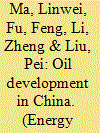|
|
|
Sort Order |
|
|
|
Items / Page
|
|
|
|
|
|
|
| Srl | Item |
| 1 |
ID:
097267


|
|
|
|
|
| Publication |
2010.
|
| Summary/Abstract |
Energy consumption in commercial buildings accounts for a significant proportion of worldwide energy consumption. Any increase in the energy efficiency of the energy systems for commercial buildings would lead to significant energy savings and emissions reductions.
In this work, we introduce an energy systems engineering framework towards the optimal design of such energy systems with improved energy efficiency and environmental performance. The framework features a superstructure representation of the various energy technology alternatives, a mixed-integer optimization formulation of the energy systems design problem, and a multi-objective design optimization solution strategy, where economic and environmental criteria are simultaneously considered and properly traded off. A case study of a supermarket energy systems design is presented to illustrate the key steps and potential of the proposed energy systems engineering approach.
|
|
|
|
|
|
|
|
|
|
|
|
|
|
|
|
| 2 |
ID:
113416


|
|
|
|
|
| Publication |
2012.
|
| Summary/Abstract |
The future of oil has become an important topic of the discussion of energy policy in China. This paper attempts to present a full picture of the current status and future trends of China's oil development through system analysis. First, we map a Sankey diagram of China's oil flow to reveal the physical pattern of China's oil supply and consumption. Then, we present the historical and ongoing trends of China's oil flow from key aspects such as oil demand, oil resource availability, technology improvement, and policy adjustment. Based on these understandings, we design three scenarios of China's oil demand in 2030, and analyze policy implications for oil saving, automotive energy development, and energy security. From the analysis, we draw some conclusions for policy decisions, such as to control the total oil consumption to avoid energy security risks, to enhance oil saving in all sectors with road transportation as the emphasis, and to increase the investment on oil production and refining to secure oil supply and reduce emissions.
|
|
|
|
|
|
|
|
|
|
|
|
|
|
|
|
| 3 |
ID:
180844


|
|
|
|
|
| Summary/Abstract |
Reducing carbon emissions in China is critical to global low-carbon transition. Switching coal to natural gas in end-use sectors is a key mitigation strategy in China, whilst insufficient natural gas reserve capacity hinders the growth of natural gas consumption. Besides strategic reserves, peak-shaving reserves are vital to tackle seasonal demand fluctuation. Identifying an appropriate scale of natural gas reserves can significantly reduce costs, whilst current studies focus on strategic reserves. In this paper, a multi-scale method is proposed to quantify the optimal scale of natural gas reserves in China, which combines three sub-models with matched temporal-spatial resolutions tackling daily, monthly peak-shaving reserves and strategic reserves respectively. Results show that the optimal scale of natural gas reserves is 14.2 percent of annual demand, higher than the level of 5.2 percent in 2017, and lower than policy targets of 15.6 percent. Results reflect the serious shortage of reserve capacity and the need of fast expansion, whilst pointing out that a small reduction in policy targets can support natural gas growth at lower costs. The optimal scale of daily, monthly peak-shaving reserves and strategic reserves is pointed out, which is 0.6, 8 and 5.6 percent of annual demand respectively.
|
|
|
|
|
|
|
|
|
|
|
|
|
|
|
|
|
|
|
|
|